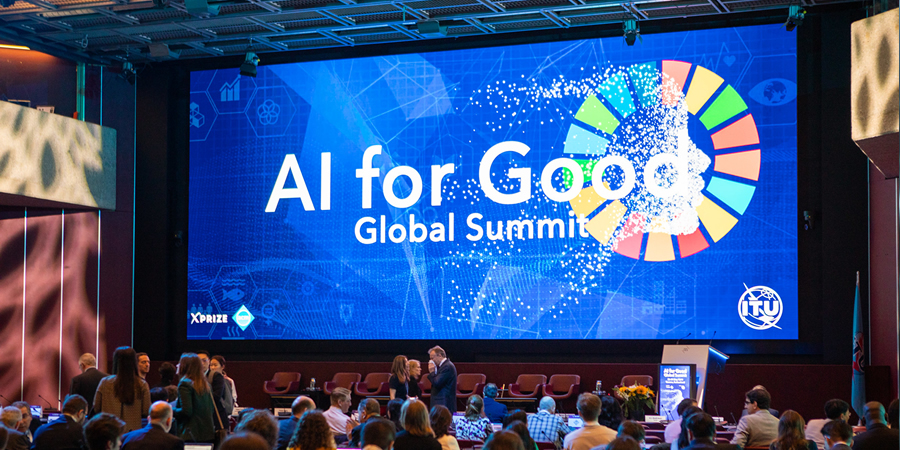Around 2000 participants from over 120 countries around the world attended the Artificial Intelligence (AI) for Good Global Summit in Switzerland between May 28-31 to discuss the latest innovations in AI and how they could be utilized to combat pressing global issues.
The summit focused on generating projects to revolutionize several industries that are facing inequalities or issues such as in education, healthcare, wellbeing, space research, smart/safe mobility, as well as economic and social inequality. The aim was to generate solutions to combat these problems and to ensure that the benefits of AI technology are leveraged to better our lives, gain our trust and ensure safety, improvements and inclusivity on a global scale.
“This summit is the leading United Nations platform for dialogue on artificial intelligence. AI is bein used to fight hunger, mitigate the climate crisis, or facilitate the transition to smart sustainable cities,” said Hulin Zhao, ITU’s Secretary-General.
He added, “AI also raises complex questions about privacy an dtrust and poses other challenges, from job displacement and potential bias in algorithms to autonomous weapons and social manipulation. What’s clear is that no one nation, no one organization, no one company and no one community can meet these challenges alone. The path to a transformative but also safe, trusted and inclusive AI will require unprecedented collaboration between government, industry, academia and civil society.”
This event is the third of its kind by the ITU, which is a United Nations agency that specializes in information and communication technology (ICT) and the summit was achieved in partnership with the XPRIZE Foundation, the Association for Computing Machinery (ACM) and 37 other sister agencies of the UN. The AI for Good series is he UN’s leading event surrounding the topic of AI.
“We need to ignite a bigger conversation centered around how to use AI and data to help find scalable solutions to the biggest challenges facing humanity,” said Anousheh Ansari, CEO of XPRIZE.
“We’re inviting innovators from around the globe to together redefine new common knowledge and frameworks to accelerate solutions to the United Nations’ Sustainable Development Goals. XPRIZE co-organized the first summit with ITU, as we believe creating safe, beneficial and ethical AI solutions can significantly improve life on our planet for all and lead us to a better future. We look forward to supporting the collaborative efforts that will come out of this Summit as we continue our partnership with ITU.”
ACM CEO, Vicki L. Hanson said, “By bringing together AI technologists with leaders in government, industry, and humanitarian initiatives, new ways to apply AI to pressing world challenges are imagined and realized.”
“Our work together there exemplifies a popular motto among ACM’s nearly 100,000 members: ‘We see a world where computing helps solve tomorrow’s problems, where we use our skills and knowledge to advance the profession and make a positive impact,” she added.
The speakers at the event comprised of 300 C-level and expert representatives from industry, government, international organizations, NGOs, civil society and over 50 universities.
The AI For Good Summits over the past few years have made way for organizations to showcase their latest tech, collaborate on new projects and generate new ideas. Industry members have begun to fully grasp the potential and the impact of AI on a global scale which will need to be done through a common enabling infrastructure- ‘AI Commons’ which refers to collaborations through the sharing of knowledge, resources, data and problem-solving approaches to aid the development and application of AI for Good projects.
“Creating safe, beneficial and ethical AI starts with collaboration. At XPRIZE, we believe AI can be used to address some of the grandest challenges of our time. We are proud to help scale AI for Good by defining new common knowledge and frameworks that are truly inclusive for all, and know this is a crucial step in advancing solutions to the United Nations Sustainable Development Goals,” said XPRIZE CEO Ansari.
The community that is involved in the Summit are working on their technologies and applications , as well as filling the skills vacuum between developers and adopters of AI, and establishing safe and ethical approaches to the technology. The ultimate goal was for them to create the right partnerships which will ensure that the potential from the ‘AI for Good’ projects are maximized and achieved on a global scale.
“AI will have the greatest impact when everyone can access its benefits,” said ITU Secretary General Zhao.
Director of the ITU Telecommunication Standardization Bureau, Chaesub Lee, echoed the same sentiments and stated, “These summits bring together a wide range of innovators, investors, data owners and humanitarian actors. Inclusive dialogue has helped them to clarify their respective roles in ensuring that AI fulfils its potential to act as a force for good, clarity that will continue to increase with the development of the ‘Ai Commons’- the embodiment of the AI for Good community’s commitment to collaboration.”
Climate change was a key topic that was discussed at the event, as it is one of the world’s biggest pressing issues due to years of damage that has been done to the environment. Petteri Taalas, Secretary-General of the World Meteorological Organization (WMO) stated in his opening address that “WMO deals with big data every day, running a 24/7 operational prediction system based on a huge amount of data gathered around the world” and emphasized the importance of AI in this situation.









